The nostalgia boom has officially hit gaming. Publishers are cashing in on beloved franchises, reviving classics with modern graphics and mechanics to keep old fans hooked while attracting new audiences. But behind the glossy remasters lies a growing risk: when nostalgia isn’t handled carefully, it can erode trust, invite backlash, and turn brand loyalty into brand liability.
Remakes demand more than sharper visuals. They require precision. Studios must honor the memories that made the original iconic while meeting modern expectations. When that balance tips too far in either direction, nostalgia’s warmth can turn cold fast, fueling online backlash and reputational fallout.
For developers, this tension is reshaping creative and business decisions alike. The question is no longer if a remake will succeed, but how long a brand can sustain goodwill before nostalgia turns on them.
How modern remakes are shaping the gaming industry
Capcom has released multiple remakes of its classic Resident Evil titles, delivering commercial and critical successes with RE2, RE3, and RE4. However, when the company’s roadmap recently pointed toward Resident Evil Zero and Code Veronica, fan forums quickly pointed out a glaring omission: while Resident Evil 1 was remade in 2002, many now expect a modern reimagining on par with its successors.
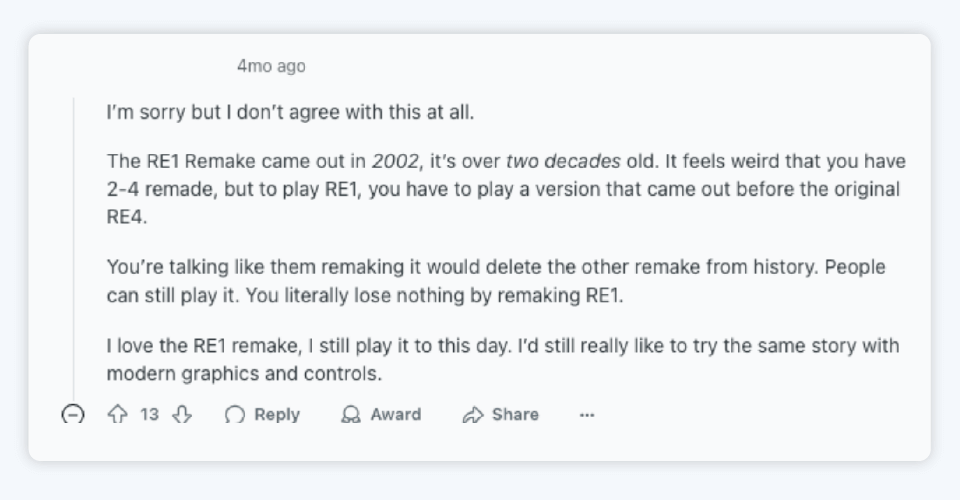
The success of fan-favorite franchises bears the risk of accusations of mishandling, or altogether neglecting, remakes of popular titles.
For companies managing popular and sometimes decades-old intellectual property (IP), this reaction illustrates a key business challenge in 2025. Nostalgia is a powerful market accelerant, but it simultaneously introduces high levels of community expectation that can destabilize brand perception.
The success of the current remake boom requires studios to manage not just creative execution, but the associated online risk stemming from often emotionally charged community backlash concerning long-held fan-favorite franchises. When studios fail to accurately gauge or appropriately manage this tension, the resulting fallout can surpass traditional public relations issues and become a real threat to brand valuation, developer safety, and future IP strategy.
Mitigating this risk requires a shift from reactive monitoring to proactive, intelligence-led insight.
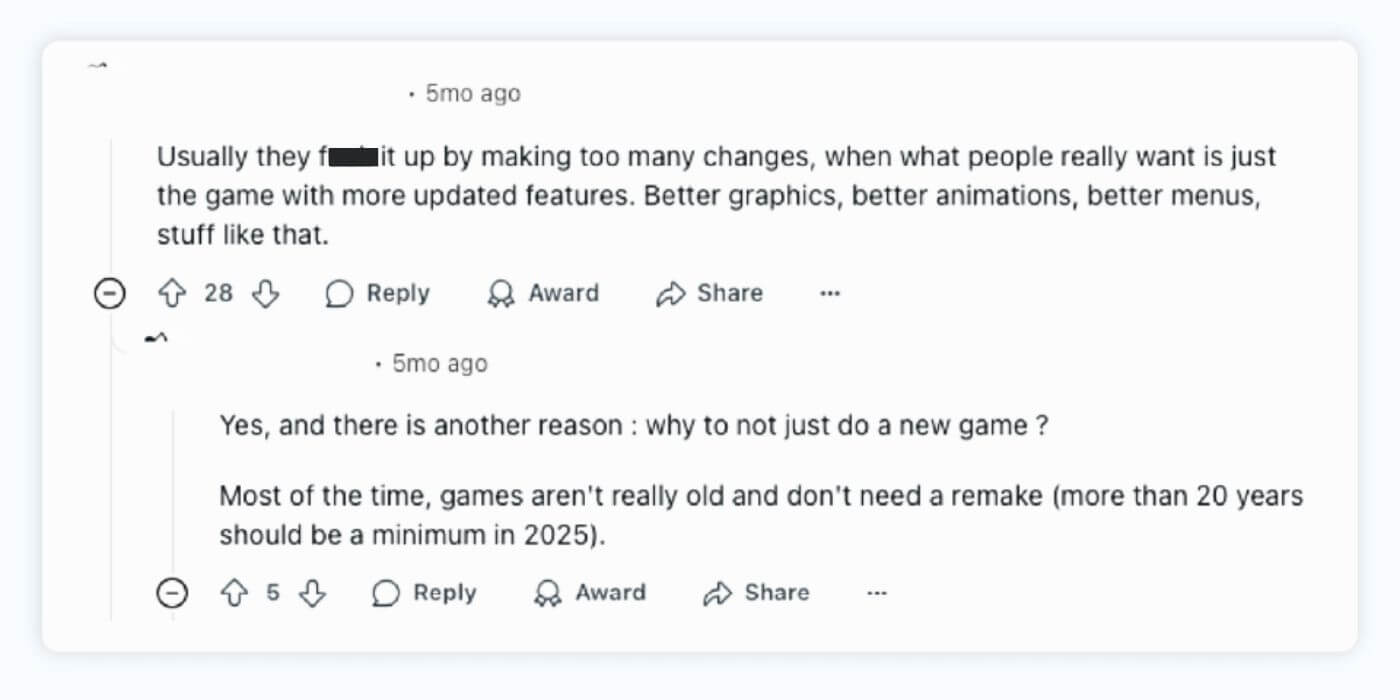
Remakes can be divisive among gaming fans. Due to the effect of nostalgia, a poorly-executed remake can be perceived as damaging a long-time favorite, while other consumers would prefer a new game entirely.
The fine line between a fan favorite and brand backlash
Recent high-profile releases show that successful remakes balance core fidelity with modernization. Square Enix’s Final Fantasy VII Rebirth (2024), Capcom’s Resident Evil 4 remake (2023), and Nintendo’s Super Mario RPG remake (2023) all launched successfully, creating modern, accessible versions of beloved classics and earning praise from long-standing fans.
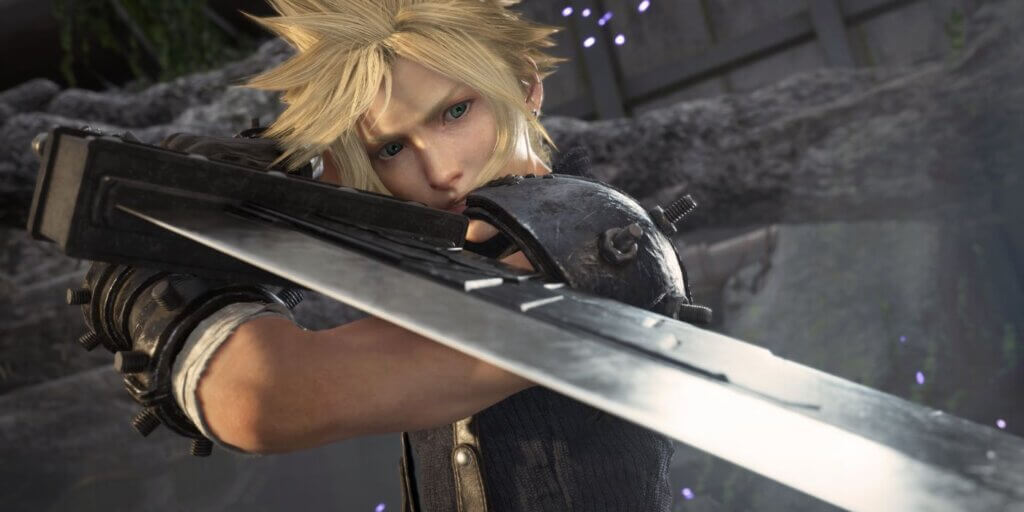 |
Strategic expansion: FFVII Rebirth expanded the world and scope while preserving core character dynamics, delivering a modern experience that retained the original narrative structure. |
 |
Targeted refinement: The Resident Evil 4 remake preserved the original game’s atmosphere and tension while adding significant mechanical improvements that lowered barriers to entry for modern players. |
 |
Visual fidelity focus: The Super Mario RPG remake focused primarily on visual updates, leaving the established turn-based mechanics largely untouched to maximize continuity. |
However, invoking deep nostalgia raises the stakes of failure. Diverging from established canon or showing a perceived lack of commitment to an IP’s legacy can spark online backlash. Such commentary is often amplified by key opinion leaders in the industry, fueling harmful narratives that can damage the game, the brand’s reputation, and, in extreme cases, threaten employee safety.
How online dissent becomes brand risk
For a gaming publisher, negative community sentiment on a remake is more than a marketing problem; it is a live risk that can compromise multiple aspects of a business. This risk is primarily driven by three notable themes:
1. Workforce security and harassment |
The most serious impact is the potential for targeted harassment and abuse directed at development staff, community managers, and named individuals. When online backlash develops into coordinated abuse campaigns, it can create real risks for workforce security and severely impact talent retention when employees face persistent online threats.
In recent years, several major development studios, including Ubisoft, have experienced targeted harassment of their employees following title releases, death threats, doxxing, and misogynistic abuse.

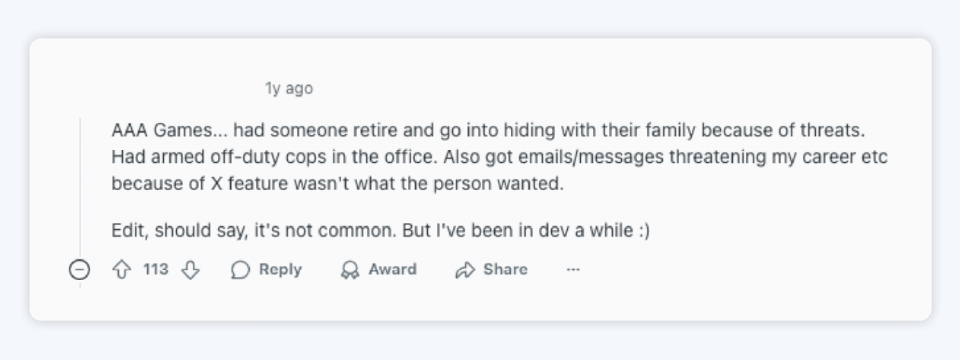
2. IP narrative control and misinformation |
Unmanaged negative sentiment can quickly evolve into misinformation or harmful narratives about the studio’s competence, commitment, or ethical practices. These narratives can spread rapidly across social platforms, permanently tarnishing the IP’s long-term reputation.
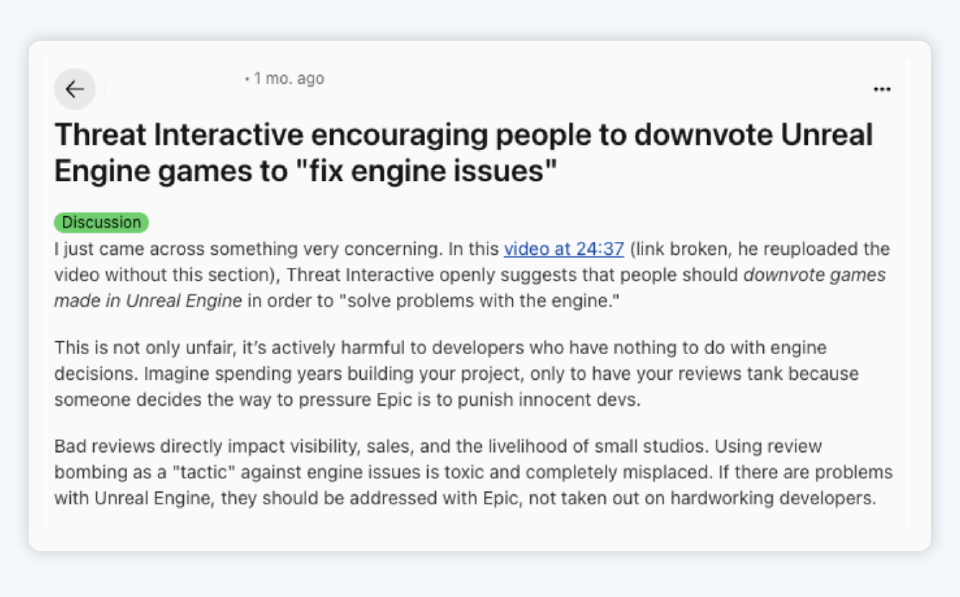
Online communities, including key opinion leaders, will seek to disparage publishers, including with coordinated group activity such as review bombing.
3. Future commercial viability |
The level of digital risk surrounding a remake is a key indicator as to the volatility of an IP. Executives and investors increasingly evaluate an IP’s viability based on the predictability of its community perception. High-friction launches introduce significant uncertainty, potentially deterring future investment in sequels or further adaptations.
Effectively neutralizing these risks requires moving beyond anecdotal observations toward a structured, Social Listening and Online Risk Intelligence framework.
The future of structured online risk intelligence
Managing community volatility requires more than anecdotal observation. It demands structure. By treating social and player data as intelligence, studios can move from reacting to backlash to anticipating it.
| Contextualized sentiment and actionable feedback: Not all negative feedback signals a crisis. The key is separating meaningful feedback from noise, helping teams uncover root causes that impact perception during a launch or update cycle. | |
| Identify patterns in recurring feedback – separating genuine critique (like bug reports, critiques of mechanical systems, or difficulty tuning) from coordinated or exaggerated negativity. This helps product and development teams triage genuine issues efficiently while focusing on what matters most to players. | |
| Proactive developer and platform protection: Early warning systems are critical for identifying when conversions shift from healthy debate to potential hostility. Recognizing these early allows developer, community, and security teams to act before small sparks turn into larger brand or platform issues. | |
| Track early signals of coordinated hostility such as sudden spikes in harassment towards named developers or community spokespeople, and establish clear thresholds for escalation so security and legal teams can engage with platform moderators and activate incident response protocols quickly and consistently. | |
| Retrospective data for strategic decision-making: Post-launch analysis should inform future development, not just recap a crisis. Understanding how sentiment evolves over time reveals what creative or gameplay choices resonated, what IP changes created friction, and how audience trust shifted. These insights shape future releases and strengthens player trust. | |
| Use retrospective sentiment data to audit trends that identify specific feature sets or narrative decisions that most significantly influenced community perception. This data is essential for product owners to refine IP strategy, ensuring future projects are strategically aligned with proven community preferences. |
Building IP resilience through data and expert insights
The reliance on nostalgic IP is a dominant commercial trend, but its high-stakes nature demands a robust digital defense strategy. True success in this landscape is dependent on a studio’s ability to manage the digital environment with the same precision and foresight applied to the game development and rollout itself.
By strategically leveraging proactive social listening and online risk intelligence, studios can move beyond reactive damage control to proactive brand protection. This empowers them to secure their most valuable assets — their staff and their intellectual property — from damaging misinformation and coordinated online attacks. In an era where player voices are louder than ever, intelligence-led insight is the ultimate cheat code for sustained success.

